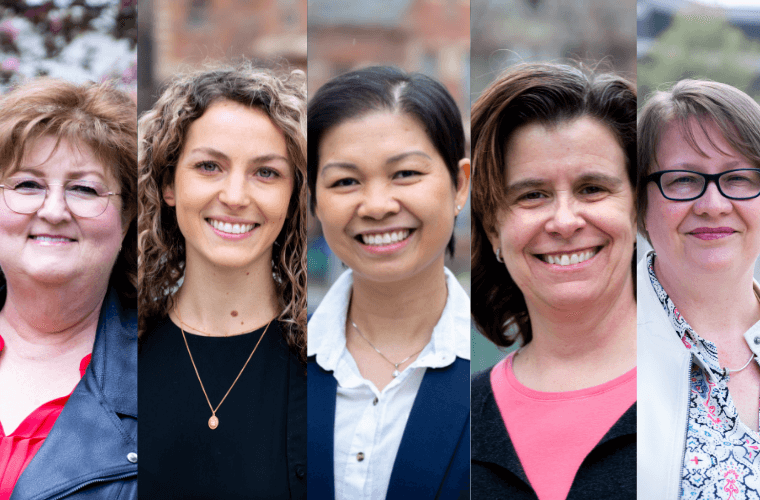With thousands of patients coming through the building since the beginning of the pandemic, this team of superheroes have worked together to protect their patients and staff from COVID-19.
(from left to right Mary Morgan, Ann Whelan, Thuong Huynh, Jill Taylor and Christine Humphreys)
Just north of Kensington Market, the Medical Building at 340 College has a long history of helping people. Within its walls, Kensington’s medical clinics help our community through safe, quality-driven care. Leading the charge in those Kensington clinics are five women who work tirelessly for their patients.
And this year, they’ve worked even harder to lead our clinics in the fight against COVID-19 and keeping people in our community safe.
They don’t call themselves superheroes, but they are. Christine Humphreys, Thuong Huynh, Mary Morgan, Jill Taylor, and Ann Whelan work together with their staff to save sight, catch cancer, and screen for disease – all essential services that people desperately need in the community. Despite ongoing challenges caused by COVID-19, they have continued to offer the safest care possible for their patients.
Even in wave three, as the COVID-19 landscape has drastically changed in Ontario, this team of leaders at 340 College Street is working to find ways to continue care for urgent patients, while also connecting with hospital partners to share staff who are desperately needed in the hospital sector.
When wave one of the COVID-19 pandemic hit, the priority for patients and staff at Kensington was protecting everyone from the virus. “We knew we had to act fast,” says Jill Taylor, Manager, Kensington Diagnostic Imaging Clinic. She helped prepare the 340 College building for reopening, secured a steady supply of personal protective equipment for all clinics, as well as worked to donate extra supply to The Gardens, Kensington’s long-term care home. Jill went so far as to volunteer at The Gardens during wave one, when long-term care was most vulnerable: “We did what we needed to do to support our Kensington family.”
Safely screening patients into buildings, ensuring proper infection prevention and control protocols were in place, and training staff was no easy task. “It was a huge undertaking once we realized how much policy we needed to implement in a short amount of time to keep everyone safe,” says Mary Morgan, Director of the Kensington Screening Clinic. It meant the leadership team had to work around the clock to hire and train staff, take shifts at the screening desk, and implement infection prevention and control policies. She explains, “No one loved being the mask police in the beginning, but we have always had to be extremely vigilant to protect everyone in the building.”
Despite clinic closures in wave one of the pandemic and now again in wave three, the 340 College Clinics still serve patients with urgent needs like those with emergency eye conditions and those who receive infusion therapy for chronic illness. The Eye Bank, for example, led by Christine Humphreys, has remained open this entire time, as they continue to process eye tissue for transplant to save people’s sight in Ontario and across Canada. At the Kensington Screening Clinic, they are taking on urgent cases referred by hospital partners.
During wave two of the pandemic, the Kensington clinics were back open and extended work hours, hired more staff, and constructed new physically distanced waiting rooms to reduce surgical backlogs caused by COVID-19, and to help expedite the treatment of patients currently waiting for eye surgery and screening procedures. Ann Whelan, Director of Ophthalmology, and Thuong Huynh, Manager at the Kensington Eye Institute, worked hard to get back to 95% of their pre-pandemic case capacity to reduce the backlog of people waiting for cataract surgery.
“With the help of all of our staff we adapted quickly and successfully,” said Ann. It wasn’t easy managing a team of more than 50 staff who were also managing their own stress about the pandemic. “I am so proud of all the people we work with for continuing to make it through these difficult times.”
And it isn’t over yet. Luckily as part of the provincial vaccine roll-out, many staff who work in the clinics as front-line health care workers are eligible and have received the vaccine, but there is still a risk. “We will always be looking out for our patients and staff. It’s our number one responsibility,” says Mary.
